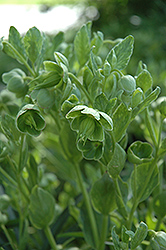Height: 24 inches
Spacing: 18 inches
Sunlight:
![]()
![]()
Hardiness Zone: 5a
Other Names: Bear's Foot Hellebore
Description:
Chartreuse colored buttercup-type blooms and glossy blue-green foliage; one of the first flowers to come up in cool weather and what a beautiful harbinger they are; great in woodland gardens and on shaded slopes
Ornamental Features
Stinking Hellebore features showy nodding chartreuse cup-shaped flowers at the ends of the stems from late winter to early spring. Its glossy pointy compound leaves remain bluish-green in colour throughout the year.
Landscape Attributes
Stinking Hellebore is an herbaceous evergreen perennial with an upright spreading habit of growth. Its relatively fine texture sets it apart from other garden plants with less refined foliage.
This is a relatively low maintenance plant, and should be cut back in late fall in preparation for winter. Deer don't particularly care for this plant and will usually leave it alone in favor of tastier treats. It has no significant negative characteristics.
Stinking Hellebore is recommended for the following landscape applications;
- Mass Planting
- Rock/Alpine Gardens
- Border Edging
- General Garden Use
- Naturalizing And Woodland Gardens
Planting & Growing
Stinking Hellebore will grow to be about 20 inches tall at maturity, with a spread of 24 inches. When grown in masses or used as a bedding plant, individual plants should be spaced approximately 18 inches apart. Its foliage tends to remain dense right to the ground, not requiring facer plants in front. It grows at a medium rate, and under ideal conditions can be expected to live for approximately 5 years. As an evegreen perennial, this plant will typically keep its form and foliage year-round.
This plant does best in partial shade to shade. It does best in average to evenly moist conditions, but will not tolerate standing water. It is not particular as to soil pH, but grows best in rich soils. It is somewhat tolerant of urban pollution, and will benefit from being planted in a relatively sheltered location. This species is not originally from North America, and parts of it are known to be toxic to humans and animals, so care should be exercised in planting it around children and pets. It can be propagated by division.
Disclaimer - This resource is provided for informational purposes only and does NOT reflect current availability. Inventory varies seasonally, so we cannot guarantee that every plant will be in stock at all times - please contact your favourite GardenWorks location directly for current availability. It does not include our entire inventory of plants, so be sure to visit GardenWorks to see varieties that may not be represented on this list.

